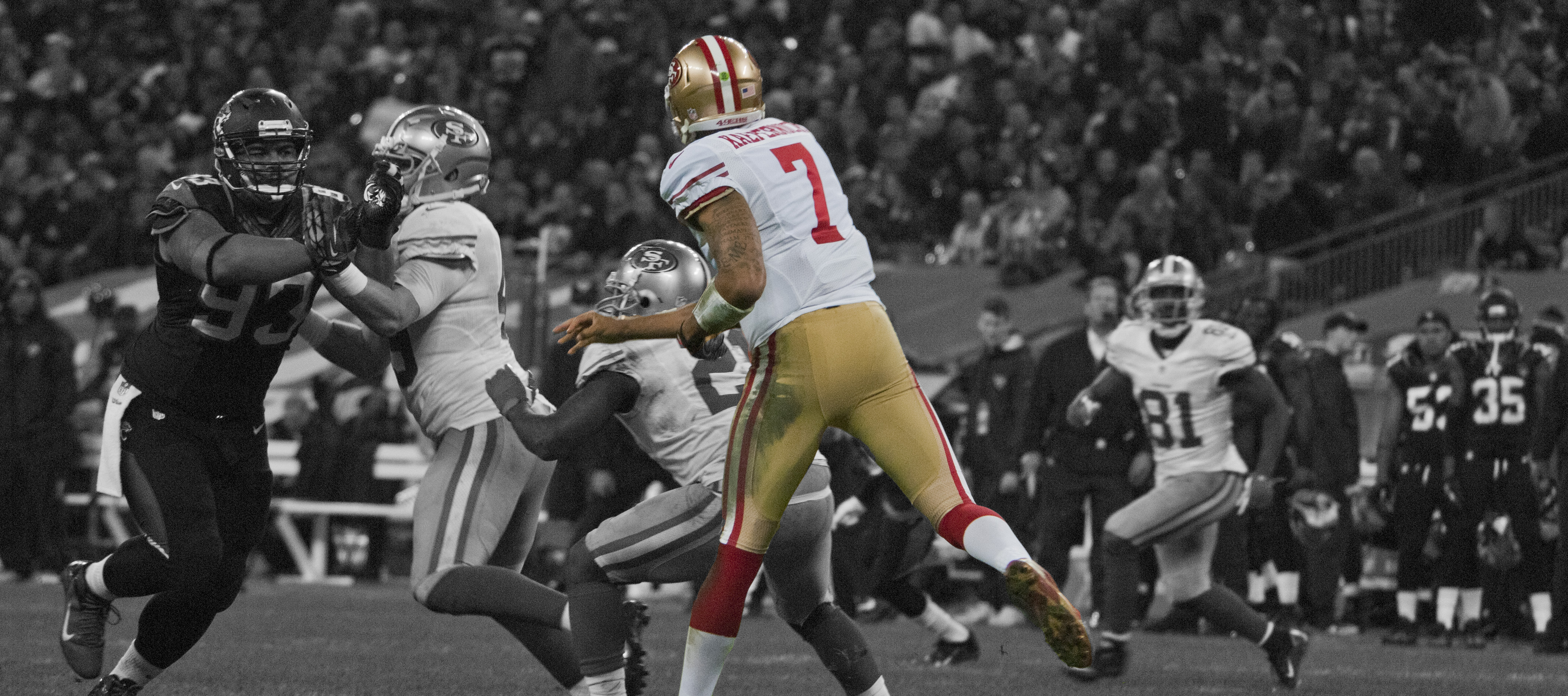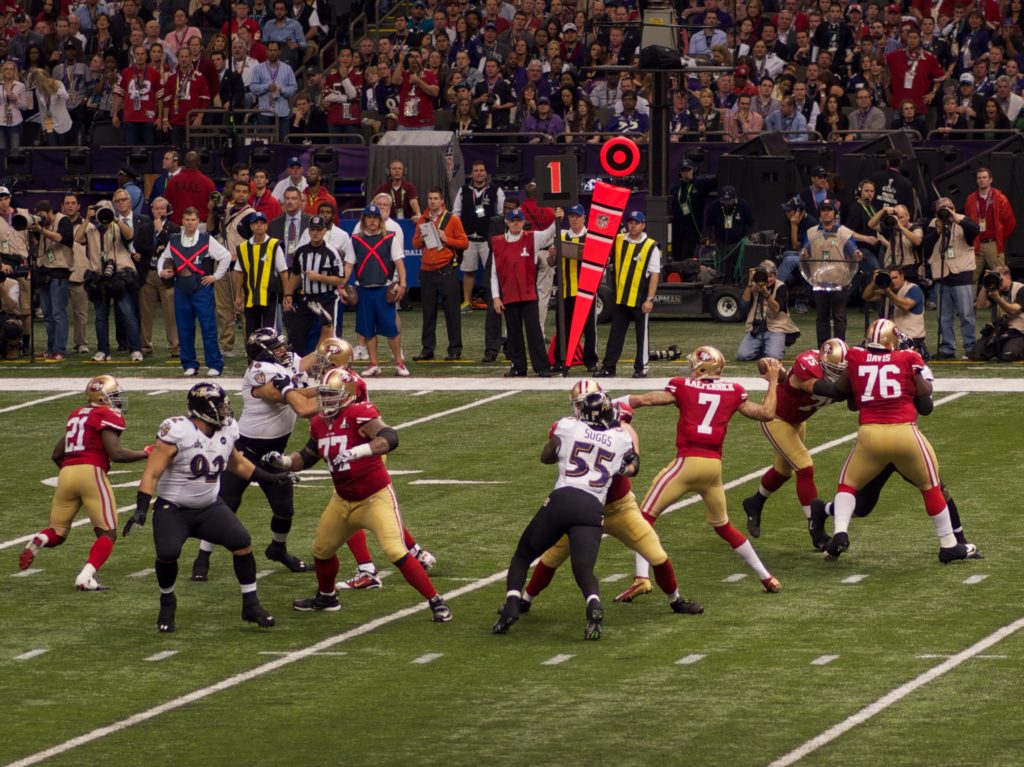Nike and Colin Kaepernomics

Sports is one of the most meritocratic facets of our modern society where performance and team contribution, rather than socioeconomic background and race, are defining factors in an individual’s success. Sports often unites people, even in times of internal conflict. One simply has to look at the tear-filled eyes of sports fans during the Olympics to see how these athletes are capable of bringing a nation together. That being said, over the past few years we have seen repeated cases of political affiliation, as a central reason in an athlete’s popularity and even employability. At the very epicenter of this question stands one man, Colin Kaepernick. In 2016, he began to kneel during the national anthem in refusal to “stand up to show pride in a flag for a country that oppresses black people and people of colour.” Following the controversy surrounding his protests, Since his protest, he has been blackballed and unemployed by the National Football League (NFL).
The NFL, much like the rest of society, is controlled by wealthy white conservatives with irreconcilable views on Kaepernick’s protests. NFL owners donate 42 times more money— $8,052,410 vs. $189,610.72— for Republican political causes compared to Democratic causes in 2015 and 2016. In addition, many prominent team owners have directly donated towards President Donald Trump’s campaign. The president himself has been one of Kaepernick’s largest critics saying “ I think it’s a terrible thing. And, you know, maybe he should find a country that works better for him.” He further urged NFL officials to suspend Kaepernick as punishment for his protests. Trump’s influence on the conservative fraternity of NFL team owners remains high and it thus comes as no surprise that Kaepernick was not signed to a team once he opted out of his contract with the San Francisco 49ers.
Resilient in the face of racism and hatred directed towards him, Kaepernick still stands strong (except when the national anthem is playing). Despite his unemployment, Kaepernick’s politicized jersey has one of the highest sales among all NFL jerseys; a greater memento of his contribution to activism rather than American football. He has transcended sports and has become a vocal activist on police brutality and racialized violence. His newest partners at Nike say he is “one of the most inspirational athletes of this generation, who has leveraged the power of sport to help move the world forward.” This status has led him to become the face of Nike’s 30th-anniversary campaign just days before the start of the NFL season.
But why did Nike choose Colin Kaepernick?
The field of marketing has seen radical changes in approach since the Mad Men era of straightforward, individual-oriented campaigns. Businesses are now taking a bolder, more political approach to appeal to consumers. Since the election of President Trump, businesses have begun to take a more notable stance on social justice issues in order to enamel their highly-curated identities to various demographics. A recent poll by Sprout Social discovered “two-thirds of consumers (66 percent) say it’s important for brands to take public stands on social and political issues.” Moreover, the majority of younger consumers are “belief-driven buyers,” wanting to personally connect with a brand or product. Thus, it is important for companies to humanize themselves by extending beyond the realm of consumerism. Nike takes this marketing approach further by choosing Colin Kaepernick as the face of their new campaign. The massive athletics company explicitly chooses a side in the polarizing debate surrounding Kaepernick.
Nike’s image exudes rebellion. Many of its campaigns have challenged the conventional status quo from its famous “let me play” commercial promoting the inclusion of girls in sports to showcasing HIV positive runner, Ric Munoz, during the 1990s when conversations about HIV were a taboo. Nike’s history of incorporating minorities into its mainstream advertisements is a marketing strategy that appeals to younger consumers. Thus, Kaepernick fits into Nike’s manufactured identity. He is bold in his rebellion against the majority of NFL fans, NFL team-owners, and the President of the United States.
What differentiates Nike from other popular social justice-centred marketing campaigns is that it does not present a guise of “unity.” This takes a different route and eclipses Pepsi’s failed advertisement in April 2017 that aimed to portray street protests against police brutality. The Pepsi campaign trivialized the protests by reducing them to harmonious gatherings that could be resolved by the distribution of Pepsi. By claiming a side, Nike has alienated political conservatives and a staggering 53% percent of Americans who say it is “never appropriate” to kneel during the national anthem. The controversial yet calculated gamble of choosing Kaepernick as a spokesperson has expectedly prompted backlash from conservatives. This has ranged from Louisiana governor Ben Zahn proposing “banning the city’s sporting clubs from buying Nike” to outraged consumers burning their previously bought Nike apparel. Moments after the campaign was announced the hashtag “boycott Nike” began trending on Twitter. Despite this “Nike stock closed at $83.49 on Friday afternoon — a 4% increase since the ad’s release and its highest price in 2018.” Additionally, online sales rose by over 30% in a single weekend. With high risk, comes high reward for Nike. But does this benefit Kaepernick’s cause?
Nike was aware of the immense media coverage it would gain by choosing Colin Kaepernick as the face of its campaign. “Google trends shows a 76 per cent upsurge in people searching for the brand since 1 September, and its social media mentions have increased by 1,678 per cent according to 4C Insights.” This amounts to 43 million USD$ worth of media exposure because of the Kaepernick connection. By choosing Kaepernick, Nike reignites the conversation centred around his protests.

Unfortunately, this message is too subtle. The Nike commercial fails to show any signs of Kaepernick’s most significant actions of kneeling. Nike chooses an activist to represent its brand without any indication of his activism. The company wants the buzz around Kaepernick while doing the bare minimum to progress his message for the Black Lives Matter movement. Nike also pledged to donate an unspecified percentage of sales revenue from Kaepernick’s apparel to his charity “Know your Rights” dedicated to educating underprivileged, minorities on legal rights, history, finance, etc. Counterproductive to Nike’s progressive image, Nike employees and its PAC contributed “$424,000 to the Republican party and its candidates in the 2018 election cycle, compared to only $122,000 to the Democrats.” Although black athletes and progressive messages are at the center of Nike’s marketing campaigns, the money Nike earns is channeled towards causes that frequently disenfranchise the same people.
Nike’s progressive marketing campaigns are not a reflection of the companies values. Although the company spearheaded marketing strategies to promote women’s rights and gender equality aforementioned, the company has been noted to be a “boys’ club.” A 2018 lawsuit against Nike, alleges that the company “breached their fiduciary duty” and created a hostile work environment for its female employees. Moreover, Kaepernick himself is outspoken about the injustices faced by black and brown people victim to mass incarceration in the US. However, the billion dollar company frequently employs prison labour to manufacture its products. By buying into this process, Nike supports an industry dubbed as “modern day slavery”; and industry that disregards the proper working conditions for employees and exploits inmates for 23 cents an hour to $1.15 an hour. These examples look behind Nike’s left-leaning, liberal veil to uncover a hypocritical, exploitative business.
Nike’s message in its commercial starring Kaepernick insinuates that consumers can buy into supporting revolutionary causes through purchasing Nike apparel, something that should never be commodified. It is almost ironic for Kaepernick’s radical protest to be repackaged and sold to the mainstream markets for profit. To their credit, Nike’s commercial starring Kaepernick reignites the national conversation concerning the Black Lives Matter movement. Nike’s progressive message in the commercial is a stance in support of the right to protest, anti-racism, and one of the most divisive figures in America at the moment. But all in all, Nike’s progressive authenticity does not extend far. Supporting Kaepernick was simply a business decision based on profitability. For Nike, the choice was Colin Kaepernomical.
Edited by Alec Regino
